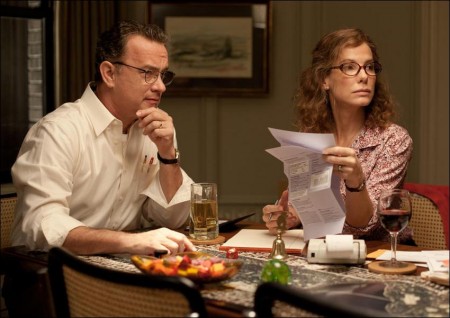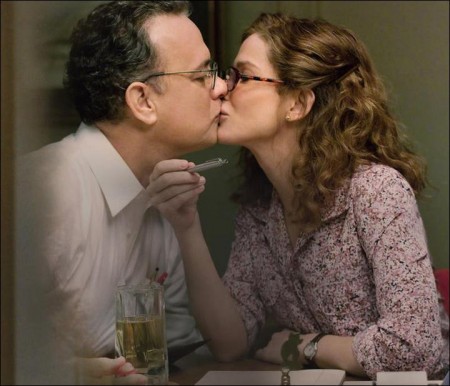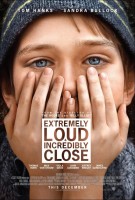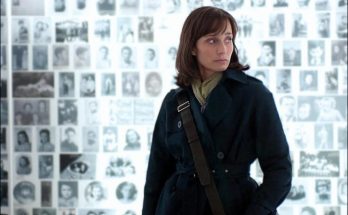Oskar (Thomas Horn) is convinced that his father (Tom Hanks), who died in the 9/11 attacks on the World Trade Center, has left a final message for him hidden somewhere in the city. Feeling disconnected from his grieving mother (Sandra Bullock) and driven by a relentlessly active mind that refuses to believe in things that can’t be observed, Oskar begins searching New York City for the lock that fits a mysterious key he found in his father’s closet. His journey through the five boroughs takes him beyond his own loss to a greater understanding of the observable world around him.
This is a serious drama centered around the 9/11 tragedy. Top-billed stars Tom Hanks and Sandra Bullock actually have supporting roles, for the lead is young newcomer Thomas Horn; other recognizable faces have very small roles. Although the main character is a young boy, the subject matter is much too intense for young kids.
About the Production
In 2005 the novelist Jonathan Safran Foer, already renowned for his blend of incisive comedy and tragedy in his debut novel “Everything Is Illuminated,” published his follow-up “Extremely Loud & Incredibly Close.” His second novel was, on the one hand, the playful story of an unusually precocious and sensitive boy who invents fantastical devices, dreams about astrophysics, collects a vast assortment of random facts – and is compelled into a quixotic odyssey through the fabric of New York. At the same time, the novel was the first major literary exploration into the grief of 9/11 families, and a study of how a child’s imagination helps him navigate overwhelming fear and unfathomable loss in the wake of events that no logic could possibly reconcile.
When director Stephen Daldry – a three-time Oscar® nominee for “The Reader,” “The Hours” and “Billy Elliot” – read the book, he was struck most of all by Oskar’s subjective point of view. An unusual child with arrestingly high intelligence yet eccentric and obsessive behaviors that might put him on the autistic spectrum, Oskar describes the world around him with his own particular mix of naiveté and insight, nervousness and boldness, incomprehension and a need to understand. Most of all, Daldry was intrigued by how this POV, just like a child’s imagination, combined random thoughts, flashes of memory, lists of ideas and impromptu fantasies with pure emotion – all at a moment when life has irrevocably changed for Oskar’s family and the world around him.
“I found it truly compelling that Jonathan Safran Foer told this story not only from the perspective of a boy enduring unimaginable heartbreak, but a boy who has his own singular view of everything,” says Daldry. “It’s a perspective that is engaging, inventive and emotionally rich.”
Daldry was also compelled to learn more about the very specific trauma experienced by the 3,000 children who lost parents on 9/11, and their struggle for resilience. He sought the counsel of a number of experts, as well as the organization Tuesday’s Children, a non-profit founded by families and friends of 9/11 victims to address the unique and ongoing challenges of those whose loved ones died in the terrorist attacks. He learned that for many kids like Oskar, the suddenness, enormity and public nature of the event left a sense of helplessness over their already profound grief.
“I started talking to a lot of different specialists, including therapists who work with children who have lost parents,” says Daldry. “I wanted to better understand the process kids like Oskar went through in the days, months and years after 9/11 – how they began to heal, or sometimes not. That process of learning went hand in hand with the development of the script. At the same time, we also consulted with experts on the autistic spectrum and Asperger’s Syndrome, which Oskar is tested for, inconclusively.”
Oskar’s very personal experience of September 11th, and what came after, was brought to the fore in a screenplay adaptation by Eric Roth, who wanted to be true to the distinctive immediacy of Foer’s novel. “It’s a very emotional book and I hope it is a very emotional movie,” says Roth. “There’s also a real kinetic energy to the book – and the challenge was to translate that into visual imagery.”
The book wove many themes – of individual and national trauma, of childhood’s strangeness, of the nature of tragedy and the endurance of love through family hardship – into its tapestry. Each of those themes was key to the storytelling, but Roth found his way in through one particular element: the relationship between Oskar and his father, Thomas, who is seen in the film entirely through Oskar’s subjective memories, which are in turn fueled by a confusing mixture of love, loss and lingering questions.
Oskar deeply misses his father’s so-called “reconnaissance expeditions,” clever puzzles that Thomas created for Oskar to solve, not only as inspired father-son games but also to help him engage with the world despite his social awkwardness. So when he finds the mysterious key in the bottom of a vase hidden in the dark recesses of his father’s closet, Oskar propels himself into a new mission to ferret out the key’s meaning.
His only clue to the key’s potential origins is the name “Black,” written on the envelope in which he found it, so Oskar dutifully makes an ambitious plan to visit all 472 people named Black in the New York City phone books, even though, according to the math, it will take him three years to do so. He meticulously charts his course, turning a map of the city into a perfectly plotted grid, sets his ground rules and starts out on foot because there could still be a risk of attack on a bus or subway.
Like many kids with gifted intelligence, high sensory sensitivity and impaired social skills, Oskar thrives on schedules, rules and facts yet his search takes him far from the predictable and the comfortable. But no matter what obstacles stand in his way, Oskar is determined to complete his task.
“Oskar is a kid who is different, but in a wonderful way,” notes Roth. “He might have a form of Asperger’s but he also has a great imagination and a real sense of curiosity along with his many fears. For a long time, he was kept afloat very much by his father who enjoyed so many similar things. So now, when Oskar finds his father’s key a year after his death, he believes it has to unlock something – a piece of advice, an object, some wisdom that his father left for him. And it leads him on an adventure that is his way of coming to terms with grief and all sorts of other things.”
As Roth began compacting Foer’s wide-ranging plot and finding the cinematic structure, he found Foer to be a supportive resource. “Jonathan is a wonderful novelist but my ability is to be a good dramatist and bring the work alive on the screen. He really trusted me in that process and we developed a very close and collaborative relationship.”
Adds Stephen Daldry: “Jonathan really understands the difference between a book and a script, and was very helpful. He never once uttered the phrase, ‘Well, in the book…’ He was always open to interpretation and reinvention.”
When the screenplay was completed, it quickly began to attract talent. “I think Oskar’s story touched everyone when they read the script, and therefore we were able to assemble a truly wonderful group of actors,” says Daldry of an ensemble that not only includes Oscar® winners Tom Hanks and Sandra Bullock, and Oscar® nominee Max von Sydow, but also introduces Thomas Horn as Oskar. The supporting cast is equally accomplished, including Zoe Caldwell, Academy Award® nominee Viola Davis, Jeffrey Wright and John Goodman.
Hanks, who plays Oskar’s father, was drawn to the way the script gets inside Oskar’s mind at a time when the power of logical facts to keep him grounded seems to have evaporated. “In the blink of an eye, the course of Oskar’s whole world changes, and he loses his only anchor,” Hanks says. “His father used to tell him that there are always clues and treasures to be found in the world. So when he finds his father’s key, it’s very interesting that Oskar devises his own elaborate hunt for what the key might mean, convinced it will somehow explain the unexplained to him. It becomes a very personal, intimate story of a kid trying to make sense in his own way of a nonsensical world.”
He adds: “It was easiest thing in the world for me to want to do this – as soon as I read it, there was not even any question.”
Taking the role of Oskar’s grief-stricken mother, whose apparent absence in Oskar’s life is not quite what it seems, is Bullock. “What I find so moving about Oskar is that he feels there has to be an answer, but there is not always a clear ‘why’ or a ‘because’ to a situation,” she says. “And sometimes the answer you get is not the one you expect, which is something Oskar has to discover for himself.”
She continues: “I think Eric Roth did an amazing job of telling this challenging story entirely through a child’s point of view.”
The Cast and Characters
At the center of Oskar Schell’s search for a lock that will accept his father’s key is the man who always compelled Oskar to puzzle out his problems and face his prodigious qualms: his father, Thomas. As a screen character, Thomas Schell was a challenge because he is seen entirely through Oskar’s eyes, to the extent that much about his history and inner life remain mysterious — except for the parts that have made an impression on Oskar and especially Oskar’s memories of their very best times together, which remain indelibly immediate to him.
To embody the essence of a father as captured in time by his young son, Stephen Daldry thought early on of Tom Hanks. “We thought that in terms of Oskar’s memories of Thomas as the perfect dad…well, who else could that be but Tom Hanks?” recalls Daldry. “Tom took that responsibility to heart and created a real bond with Thomas Horn that was evident to everybody on the set. They were absolutely charming together, which was great for me as a filmmaker, because they created this dynamic relationship and all I had to do was shoot it. It was an act of real dedication by an extraordinary actor and collaborator.”
Hanks says he gave a lot of consideration to the kind of father Thomas was to Oskar prior to his death. He also kept in mind that Thomas was himself a child of immigrants who took up the trade of jewelry as his only clear opportunity to support his family, even though he dreamed of being a scientist. “I think Thomas was someone who felt the real task in his life was to make sure that his very bright son became a well-rounded, content human being who might make the world a better place,” Hanks says. “Since Thomas himself grew up without a father, fathering Oskar was the most important thing to him. I think he loved inventing wild stories for Oskar, like the one he makes up about New York’s lost Sixth Borough, but he also very clearly designed these stories to get Oskar out in the world and help him feel safe there.”
In part, Hanks drew on his own experiences as a father. “The emotional part of it for me was going back and remembering what it’s like to have an 11-year-old kid who is bubbling over with life,” he says.
While Hanks believes Thomas was well aware that Oskar often showed signs of behavior akin to Asperger’s Syndrome, he also says Thomas readily accepted and even related to many of his son’s oddities and phobias, which made the two of them even closer. “I think Thomas wasn’t bothered at all by his son’s behaviors,” he says. “Instead, he looked for ways to build bridges over Oskar’s turbulence, over his constant questions, his flights of fancy and his fears. Yet because of that, when he’s gone, it magnifies the incredible loss for Oskar even more.”
Unlike Oskar’s father, his mother, Linda, has always found it tough to reach her son, and that only seems to increase by a factor of 10 when her husband is no longer there to bridge the gap. Yet, much as she seems lost in her own private realm of grief, Linda is connecting to Oskar in ways of which he is not even aware.
Daldry felt there was an organic empathy in Sandra Bullock that would allow the role to work. “Sandra is a first-rate actress who really took her role to heart,” he says. “She looked after Thomas very well and formed a strong relationship with him that translated to the screen. She was able to bring a gravitas that was entirely appropriate but also a real charm.”
For Bullock, the intriguing part was playing a mother who has to work at bonding with her son and forging her own route back into his world after his father’s death. “I think when Thomas was alive, Linda was always okay with just stepping back and letting Oskar and his father be a great team together,” she observes. “But now that Oskar has lost his playmate and the one person who grounded him and who he felt was his intellectual equal, she isn’t sure she can be any of those things to her son. And she’s in the process of grieving too, so she doesn’t have much energy to fight for that connection she so desperately wants with him. She has to struggle to find the solution.”
Given the subjective, first-person viewpoint of the film, Bullock also had to play her character the way Oskar perceives her – which was especially difficult because Oskar does not see the full picture of his mother. “I had to come to grips with the idea that the audience is seeing Linda on the screen entirely through Oskar’s point of view – and his view of her is not always very favorable,” she explains. “In some scenes, she can seem to be the opposite of nurturing, yet later, it becomes clear what is really going on with her. Still, I had to be okay with her looking at times like she wasn’t being a good mother to a child who is really in need. Part of it is that what Oskar sees is her grief, which is ugly and imperfect, but also very real. But what Oskar doesn’t know is that she is also very worried about him and that causes her to really try to think like he does.”
To explore Linda Schell’s experience more deeply, Bullock listened to recordings of phone calls and voice-mail messages left by those trapped in the World Trade Center for their families. “That was very hard for me,” she says. “But what floored me was to hear people giving comfort to those they were leaving behind. You really understand that the pain of hearing that is something that could never go away.”
The most daunting role to cast was Oskar himself, who like many bright children is full of contradictions. He is at once a naïve, hurt, hypersensitive child overwhelmed by sensory stimuli and afraid of loud noises, ringing telephones, bridges, elevators, public transportation and tall buildings. Yet at the same time, Oskar is a bold explorer, ready to crisscross New York neighborhoods and knock on the doors of strangers, looking for one lone lock in a city of millions.
The filmmakers set out in search for a kid with an authentically uncommon intelligence, yet one who also had natural acting ability, and ultimately discovered Thomas Horn, a 13 year-old “Kids Jeopardy!” contestant who speaks four languages. “Thomas is a super smart, funny, engaged child with the dedication and tenacity of someone much, much older,” comments Daldry. “He loved learning the methodology of acting. And he really responded to the math of figuring out, ‘Oh, I see, if I do this, that happens.’ It didn’t take long before everyone in the crew began to feel that we weren’t dealing with a child actor. He was just our leading man and he proved to be extraordinary.”
Horn admits he did not know what to expect at first. “When I found out I got the role it was earth-shaking, because I’d never done anything like this before,” he relates. “But it was also something new and different and exciting.”
He was immediately able to relate to Oskar’s way of trying to make the world manageable through facts and figures. “I think Oskar is a very logical person who likes to think things through, only now he’s in inner conflict because things around him aren’t making sense,” Horn says. “That’s why he hopes finding the lock will make sense of his father’s key.”
Despite having never set foot on a movie set before, Horn says he never felt intimidated. “I had the greatest director to work with in Stephen Daldry. I mean, he’s the first director I’ve ever worked with, but I can’t imagine a better one,” he says. “He always told me if I was doing something right, and he always told me very gently how I might improve. He encouraged me and I never felt bad about myself because he helped make me feel confident.”
Hanks especially enjoyed the chance to work so closely with Horn in his first film role, establishing a father-son rapport that is akin to a best friend relationship. “Thomas showed great instincts and was very focused,” Hanks comments. “In fact, he always managed to find the odd, different little things that can spark a scene, which are things that a seasoned actor does to bring something new and exciting to it.”
Horn’s scenes with Bullock were more challenging because they were often emotionally charged. “Some of the scenes we had together were hard for me because Oskar gets very upset – but it really moved me when I acted with Sandy,” Horn shares. “It felt almost like a real situation because she was really reacting to me, influencing how I felt.”
Bullock was taken by the psychological complexity Horn brought to such tricky interactions. “Thomas really dove into playing Oskar and he was fearless about it,” Bullock says. “He came prepared, he was steadfast, and his professionalism was impressive. And he is so smart. He was wonderful to work with and I admire him a great deal.”
In the aftermath of “The Worst Day,” one of Oskar’s few sources of comfort is his paternal grandmother, who lives across the street, only a window’s view away. The two of them share a close-knit relationship fueled by late-night walkie-talkie communications. It is she, not his mother, whom Oskar turns to when things start to get overwhelming.
Playing Oskar’s grandmother is veteran stage actress Zoe Caldwell, a four-time Tony Award winner. To deepen her performance, Caldwell turned to the character’s extensive back-story in the novel, the details of which are only alluded to in the film.
“Oskar’s Grandmother was German, living in Dresden at the time of the bombings there,” Caldwell explains. “She was married, but her husband made her promise never to bring a child into that world. She broke their agreement and gave birth to Thomas, who grew up to be a remarkable man and who, in turn, became the father of this very remarkable little boy.”
Having been a great admirer of her work on stage, Daldry had hoped to work with Caldwell for a long time. “Zoe is a giant of the American theatre whom I’ve loved for years,” he says. “She relished the part and had a lot of fun with it, forming a fantastic relationship with Thomas.”
Though Oskar often confides in his grandmother, he cannot risk telling her about his mission to find the lock that matches his father’s key. But one night when he seeks her counsel, he instead meets up with the enigmatic, silent man known only as “The Renter,” who is a boarder in her apartment. Venerated actor Max von Sydow plays the mysterious old man who can communicate only via scrawls on a notepad yet becomes Oskar’s only confidante on his quest.
Von Sydow – whose prodigious film career began in the 1950s with Ingmar Bergman’s “The Seventh Seal,” and continued through ten more films with Bergman and six decades of memorable and award-winning roles – had a strong emotional reaction to the story of “Extremely Loud & Incredibly Close.”
“I was extremely moved by the script, which doesn’t happen often,” von Sydow states. “And I liked the idea of playing this enigmatic figure, this apparent stranger who tries to help Oskar in his search. It really is an interesting friendship that develops between them.”
The character remains mute throughout the movie, so the actor strove to express his moments of anguish, curiosity and delight entirely through his face and body. Says Daldry of the unusual, wordless performance: “Max turned in a performance unlike any other he’s done — and I think it’s the kind of performance he’s always wanted to do. I honestly believe he’s created one of the most extraordinary characters of his career; he’s profoundly nuanced, complicated, funny and sensitive…without uttering a sound.”
As Oskar progresses along his mission, he also encounters hundreds of diverse strangers throughout the city who share only one thing in common: the name Black. The first people Oskar meets, who will prove vital to his search in unforeseeable ways, are Abby and William Black, a divorcing couple played by Viola Davis and Jeffrey Wright.
Wright says that the screenplay had an immediate impact on him. “I finished reading the script backstage one night when I was working on a play,” he recalls. “The director came to my dressing room, saw me in a state and asked if I was alright. I told him I was just trying to put the pieces of my mind and my heart back together after reading this.”
He was also drawn to working with Daldry, an experience that lived up to his expectations. “Stephen is from a theatre background, as am I,” Wright notes. “He allows you to craft and mine the character, go deep into the scene, and then really refine it in a way that’s rare in film.”
The director was equally eager to work with Wright. “We always wanted Jeffrey as William Black,” Daldry says. “He is so intelligent and compassionate and brings such range to the role. He nailed it for us in a way that was even beyond expectation.”
In Viola Davis, Daldry saw an actress with the ability to make just a few key scenes resonate. “Viola is one of my favorite actresses in the world,” he notes. “She is among the most respected talents today and we were so lucky to have her.”
Davis approached Abby as a woman going through marital discord, who finds unexpected solace in her strange initial encounter with Oskar. “I think the fact that Oskar finds beauty in Abby restores her self-esteem at a time when she really needs that,” she explains. “In a way, Abby and Oskar are both alone with their grief, yet when they meet they start to feel for each other and want to hold each other up.”
Rounding out the main cast is John Goodman in the part of Stan the Doorman, who guards the lobby of Oskar’s apartment building and enjoys a running banter with the boy as he comes and goes. “Stan is a little bit like Oskar’s foil,” Goodman comments. “They have a wise-guy thing going on between them, but I think Stan is really very fond of him. And he knows Oskar is twelve times smarter than he is.”
Stan also unwittingly provides Oskar with the first of many tools he requires to embark on his search: the phonebooks of all five New York boroughs. “Stan is a small but critical role,” Daldry says, “but John reassured me that he wanted to be a part of the story, and I think he adds a wonderful comedic dimension, and shows us yet another side of Oskar – a side that only Stan ever sees.”
Extremely Loud and Incredibly Close
Directed by: Stephen Daldry
Starring: Tom Hanks, Sandra Bullock, James Gandolfini, John Goodman, Viola Davis, Chloe Elaine Scharf, Stephanie Kurtzuba, Eva Kaminsky, Hazelle Goodman
Screenplay by: Eric Roth, Jonathan Safran Foer
Production Design by: K.K. Barrett
Cinematography by: Chris Menges
Film Editing by: Claire Simpson
Costume Design by: Ann Roth
Set Decoration by: George DeTitta Jr.
Art Direction by: Peter Rogness
Music by: Alexandre Desplat
MPAA Rating: PG-13 for emotional thematic material, some disturbing images, and language.
Studio: Paramount Pictures
Release Date: December 25, 2011
Hits: 96





